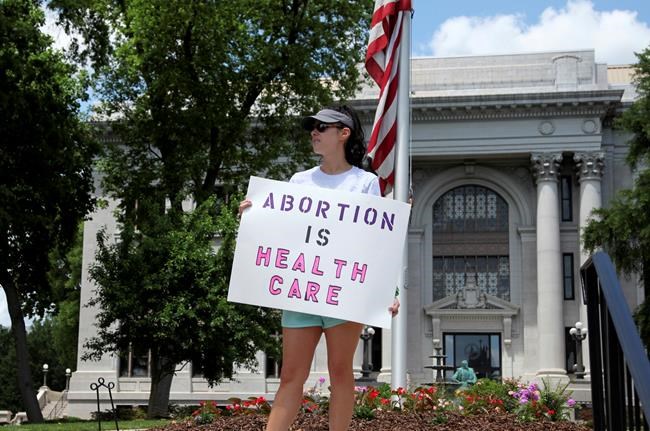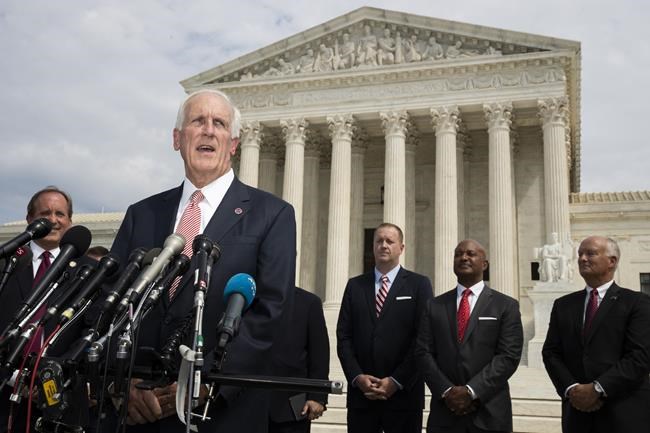Court lets Tennessee 6-week abortion ban take effect
Advertisement
Read this article for free:
or
Already have an account? Log in here »
To continue reading, please subscribe:
Monthly Digital Subscription
$0 for the first 4 weeks*
- Enjoy unlimited reading on winnipegfreepress.com
- Read the E-Edition, our digital replica newspaper
- Access News Break, our award-winning app
- Play interactive puzzles
*No charge for 4 weeks then price increases to the regular rate of $19.00 plus GST every four weeks. Offer available to new and qualified returning subscribers only. Cancel any time.
Monthly Digital Subscription
$4.75/week*
- Enjoy unlimited reading on winnipegfreepress.com
- Read the E-Edition, our digital replica newspaper
- Access News Break, our award-winning app
- Play interactive puzzles
*Billed as $19 plus GST every four weeks. Cancel any time.
To continue reading, please subscribe:
Add Free Press access to your Brandon Sun subscription for only an additional
$1 for the first 4 weeks*
*Your next subscription payment will increase by $1.00 and you will be charged $16.99 plus GST for four weeks. After four weeks, your payment will increase to $23.99 plus GST every four weeks.
Read unlimited articles for free today:
or
Already have an account? Log in here »
Hey there, time traveller!
This article was published 28/06/2022 (1259 days ago), so information in it may no longer be current.
NASHVILLE, Tenn. (AP) — A federal court on Tuesday allowed Tennessee’s ban on abortion as early as six weeks into pregnancy to take effect, citing the Supreme Court’s decision last week overturning the landmark Roe v. Wade abortion rights case.
The action by the 6th U.S. Circuit Court of Appeals comes before Tennessee’s other abortion ban, the so-called trigger ban, is expected to restrict abortion almost entirely by mid-August, according to a newly detailed legal interpretation by the state attorney general. Both measures would make performing an abortion a felony and subject doctors to up to 15 years in prison if convicted.
Republican Attorney General Herbert Slatery filed an emergency motion Friday to let state to begin implementing the six-week ban. GOP supermajorities in the Legislature passed the law in 2020 with Republican Gov. Bill Lee’s backing, and it was quickly blocked in federal court.

Specifically, the ban halts abortion once cardiac activity is detected, which is around six weeks in pregnancy— when most women don’t know they’re pregnant.
“There are a lot of things that I am very passionate about and take very personally in this job that I have, but … this was the most important thing that I could do as governor,” Lee said while speaking virtually with anti-abortion religious leaders Friday, after the Supreme Court ruling.
Lee said Tuesday that the federal appeals court’s decision marked “another significant protection for unborn children in our state.”
It only makes an exception when an abortion is necessary to prevent the woman’s death or “serious risk of substantial and irreversible impairment of a major bodily function.” However, it specifies that a woman’s mental health does not qualify for an exemption.
“Abortion bans rob people of their ability to make the decisions that are best for themselves, their lives, and their futures,” said Ashley Coffield, president and CEO of Planned Parenthood of Tennessee and North Mississippi, in a statement. “It is unconscionable that Tennesseans will lose access to abortion in their communities because of this decision.”
Planned Parenthood was not performing abortions at its facilities in Nashville and Memphis on Monday in anticipation of court action to unblock the six-week ban, said spokesperson Matt Anderson.
Separately, abortion provider carafem — which has a clinic in Nashville — announced Tuesday that its staff had been flooded with calls from patients trying to understand Tennessee’s new legal landscape.
“In my more than 30 years in health care, nothing has been as hard as turning away patients from the care they need because politicians interfered with private health care decisions,” said Melissa Grant, carafem’s chief operations officer, in a statement.
An even more restrictive ban is set to take effect soon, according to the attorney general’s guidance Tuesday. Tennessee’s trigger law — set to go into place 30 days after the end of Roe — would ban all abortions statewide, with essentially the same limited exceptions as the six-week ban.
That law requires the attorney general to certify that Roe has been overturned. He hasn’t done so yet, but indicated Tuesday that he plans to do so when the corresponding judgment is filed in the Supreme Court case, by no later than mid-July. That puts the effective date at around mid-August, Slatery’s office said. The law ties the effective date to the judgment filing, not the timing of the attorney general’s action.

Democratic lawmakers at the time attempted to amend the measure to allow exceptions for incest and rape — including rape of a child — but Republicans ultimately spiked those suggestions.
Bans pegged to the “fetal heartbeat” concept — such as Tennessee’s six-week ban — have been signed into law in more than a dozen states. Supporters commonly argue that abortion as early as six weeks into pregnancy “stops a beating heart,” but medical experts say those claims are false.
That’s because at the point where advanced technology can detect that first flutter, as early as six weeks, the embryo isn’t yet a fetus and it doesn’t have a heart. An embryo is termed a fetus beginning in the 11th week of pregnancy, medical experts say.
The Supreme Court’s ruling last week is likely to lead to abortion bans in roughly half of the states.
Additionally, in Tennessee, voters approved an amendment in 2014 declaring that the state’s constitution doesn’t protect or secure the right to an abortion or require funding for abortions.
Trigger laws, like Tennessee’s 2019 version, are also being targeted by lawsuits in other states. In Louisiana on Monday, a state district judge in New Orleans temporarily blocked enforcement of that state’s trigger-law ban on abortion, after abortion rights activists argued that it is unclear. The ruling is in effect pending a July 8 hearing.
Tennessee’s 2020 law includes the six-week ban and bans longer into the pregnancy, in the event that the Supreme Court did not fully overturn Roe v. Wade.










